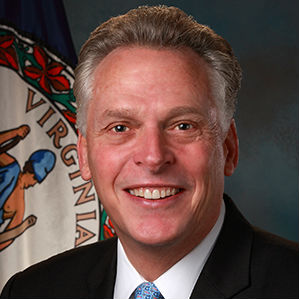
Chairman Stosch, Chairman Colgan, Chairman Jones, Chairman Ware, Members of the General Assembly, ladies and gentlemen: Good morning.
And to my wife, First Lady Dorothy McAuliffe, and members of my cabinet, thank you for being here today.
Yesterday, our Commonwealth was shaken by yet another terrifying and heartbreaking tragedy. I ask you to join me in a moment of silence for the two young people who were killed, their families and the businesswoman injured in the attack.
Thank you.
This is the second time that I have appeared before you to deliver the year-end financial report and to provide you with a budget update. My message last year was not a happy one, to say the least. I reported to you that, due to the impact of federal spending cuts and congressional dysfunction, the Commonwealth’s economy was underperforming compared to the nation. In fact, we were stumbling along at the rear of the pack.
In calendar year 2014, Virginia ranked 48th in the nation in our rate for economic growth – with states such as West Virginia and South Carolina well ahead of us.
How did this happen? Partisan battles in Washington dealt Virginia a series of major body blows that seriously weakened our economy.
Automatic federal budget cuts reduced military contracts in Virginia by $9.8 billion between 2011 and 2013 and threatened to eliminate 115,000 jobs in the Commonwealth.
In 2013, members of Congress got mad at each other and shut down the federal government, causing still more damage to Virginia’s economy.
Last June, while national job growth was 1.9 percent, here in Virginia we were eking out a meager 0.4 percent growth. Our wage growth was stagnant, and the housing market was treading water.
All of that bad news had a predictable effect on our state revenues.
I reported to you last summer a total expected shortfall of $2.4 billion through June 30 of 2016.
But even with those tough numbers, I remained optimistic.
We laid out the opportunity that we saw for all of us to work together and build a new Virginia economy that would diversify our employment base so that the Commonwealth would be less dependent on federal spending and better able to weather the seemingly endless barrage of political and fiscal storms brewing in Washington.
I offered to sit down with you and negotiate a fair plan for achieving that goal, and I asked for your support. Specifically, I asked for the resources necessary to continue my mission of attracting new, emerging industries to strengthen our core economic base, stimulate growth and ensure long-term prosperity.
You heard me out. And you responded. We had to make some tough decisions, but we didn’t let that rattle us. We sensed that the Commonwealth’s stability was riding on our ability to reach consensus.
It was a bellwether moment. We all took a leap of faith together, and we landed on our feet.
I specifically want to thank Chairman Stosch, Chairman Colgan, Chairman Jones and Chairman Ware for the many hours you spent in my conference room working together on this important task. You left politics at the door and did what was best for the Commonwealth of Virginia. Thank you.
Now fast-forward to today.
It is my pleasure to stand before you and say, “What A Difference A Year Makes!”
We’ve had a remarkable turnaround. You can see the results in state revenues, driven by new jobs and business investments.
With increased resources you provided in the state budget, my team and I have worked tirelessly to move this Commonwealth forward and to compete more effectively in this fast-changing 21st century economy.
I am so proud to announce that so far in our Administration, we’ve had 462 jobs announcements with more than $7.7 billion in capital investment. Not that I’m counting, but that has shattered the records of all previous Virginia governors.
Earlier this summer, my marketing mission to Europe generated two significant deals with Lidl and Elephant Auto Insurance that will bring 700 jobs to Arlington and Spotsylvania County and more than 1,700 jobs to the Richmond area.
In June, we announced that Qore Systems LLC is creating 140 jobs and investing $12.8 million to relocate from Arizona to a Virginia business park jointly owned by Smyth and Washington counties. We beat out North Carolina for that deal. Also in June, we announced that Monogram Foods is expanding in Henry County to create 101 new jobs. This is Monogram’s second economic development announcement during this Administration. The first created 200 jobs.
In the latest sign of our economic transformation, July’s drop in the unemployment rate to 4.8 percent puts us well below the national rate of 5.3 percent. We now have the lowest rate of any state in the Southeast. We’ve had 16 consecutive months of positive year-over-year job growth, and that strong performance translates into 40,700 additional jobs since July 2014.
Indeed, Virginia’s July employment total of nearly 3.82 million is above the June 2008 pre-recession peak of 3.79 million. Our job growth is solid, and this summer we had more Virginians working than at any time in the history of the Commonwealth.
And the average weekly wage last month for private employees was 4.6 percent higher than July 2014.
It also gives me great satisfaction to tell you that Virginia’s veterans have been on the front lines of our economic resurgence. 80,000 veterans have joined Virginia’s labor force in the past five years — more than all of the other states combined.
And our Virginia Values Veterans program is ensuring that they make the successful transition to good-paying civilian jobs.
Virginia companies have hired more than 11,000 veterans to date, helping us reach that goal 900 days ahead of schedule. And because of those great results, I have set a new goal to hire 20,000 veterans through the V3 program by the end of my Administration.
The uptick in jobs means there is less pressure on the Trust Fund that provides unemployment benefits to displaced workers. This improved forecast is good news for our employers, who should see a reduction in their business costs next year with the elimination of the $16-per-employee surtax that has been in place to cover jobless benefits for the past five years.
Finally, in the housing market, Virginia experienced its strongest second quarter since the 2008 recession.
Virginia workers, business owners and families are looking into the future with confidence.
And I’m particularly proud to say that includes our state government employees, who will be receiving a well-deserved raise in just 5 days.
Our reversal in fortune has had a dramatic impact on our state revenues, with collections outpacing the forecast by substantial sums.
As you know, we reached the end of fiscal year 2015 with a revenue surplus of $549.6 million, excluding transfers.
This represents the largest revenue surplus in the Commonwealth’s history, exceeding the $544.6 million revenue surplus in fiscal year 2005. Total revenue collections rose by 8.1 percent in fiscal year 2015, ahead of the revenue forecast of 4.7 percent growth. And for the first time in the history of our great Commonwealth, monthly revenue collections topped $2.1 billion in June. Again, “What A Difference A Year Makes.”
The fiscal year 2015 revenue surplus is largely due to strong individual nonwithholding and payroll withholding.
Payroll withholding and sales tax collections both finished above the forecast. Together they represent 85 percent of our total revenues, and they are the best indicators of our current economic activity in the Commonwealth.
The performance of withholding receipts was particularly impressive. After growth rates of 2.1 percent in fiscal year 2013 and 2.3 percent in fiscal year 2014, withholding collections more than doubled to 5.3 percent last year.
In its simplest form, withholding growth is the product of wage and job increases. Clearly, last year’s revenue performance in this source is an indicator that Virginia’s overall economy is growing stronger and healthier with each and every day.
And we can also take great satisfaction in our recordation tax collections, which have experienced double-digit growth for the past eight months. That is incredible news for the housing market, which also positively affects sales tax collections.
So now let’s look at the bottom line for the state budget.
As we’ve already discussed, we ended the 2015 fiscal year with a revenue surplus of nearly $550 million. Because of last year’s revenue decline, the budget called for a $470 million withdrawal from the rainy day fund at the end of June. Keep in mind, however, that we are due to make a $605 million deposit in fiscal year 2017, pushing the fund up to about $845 million by June 30, 2017.
Focusing for the moment on the current status of our fiscal books, after we factor in all end-of-year transfers, we completed the 2015 budget year with new general fund resources of $536.2 million.
Every penny is already obligated to priorities such as the rainy day fund and the water quality improvement fund.
So we start off this year with a clean slate. We have greatly improved our liquidity or cash-on-hand in the general fund of the Commonwealth. We have also maintained our triple-A bond rating throughout a period of historic revenue fluctuations and economic challenges.
And I want you to know that I have continued to keep a sharp focus on the budget priorities we identified and on our shared goal to protect taxpayer dollars.
We made prudent, sensible spending decisions that put good governance and the best interests of the taxpayers ahead of ideology.
Because of the efforts of the General Assembly in 2013, I had real resources to invest in transportation. That had not been the case for many years.
One of my first major actions in transportation was to deliver on a campaign promise to “pick the right projects” – and take politics out of transportation. I worked with Speaker Howell, Delegate Stolle and other members of the Assembly to pass House Bill 2 last year.
This requires that all projects – other than maintenance, bridge replacement and safety – go through a statewide evaluation process to understand the benefits for congestion relief, economic development, land use, safety, the environment and accessibility.
The Commonwealth Transportation Board adopted the process this past June and is currently soliciting projects from local communities. In February, scores will be released for each project – and then the Board will pick the projects based solely on their merits.
This is a major reform for transportation and will help improve Virginia’s economic competitiveness.
We also had to confront serious problems with some transportation projects because of contracts negotiated before I took office.
Let’s start with Route 460. $236 million spent. Not one spade of dirt turned.
We terminated that contract and negotiated a deal that returned $46 million to the Commonwealth for other transportation projects and eliminated an additional $103 million Virginia owed under the old agreement, for a total savings of $149 million.
We renegotiated the contract on the Midtown/Downtown Tunnel project, one of the worst deals in Virginia history.
As a result of that renegotiation, we eliminated tolls on the Martin Luther King Expressway and reduced the toll burden on economically stressed residents of Portsmouth.
Working with Chairman Jones and the General Assembly on a bipartisan basis, we have enacted legislation that will ensure no future governor will be put in the position that I was faced with on the 460 project.
There were also problems demanding my attention at the Port. Over the last five years, the Port lost more than $120M. When I took office, we took decisive action to replace the Board and to support the new Director, John Reinhart.
I am happy to report that this year, the Port posted an operating profit of $14.2 million – a $30.8 million swing from the past fiscal year. This required making tough decisions, and there is still more work that must be done. But this is a significant achievement. It is the first operating profit since 2008.
The Port is a key economic asset for the Commonwealth and creates jobs throughout Virginia. We need to have a healthy port that generates economic development, and we are on a path to reach that goal. And in the near future, we will have more exciting news about our Port, so stay tuned.
An unfortunate event took place last October at our spaceport in Wallops when a space vehicle crashed into and damaged the launch pad.
This mishap was made worse by the fact that the pad was not insured, meaning that the Commonwealth was left fully on the hook to repair the damages. Ladies and gentleman, you should not try to launch a rocket into space without insurance. If that rocket had crashed a few feet away, it could have wiped out the $150 million launch pad.
Earlier this month, I announced that we had reached agreement with Orbital ATK and NASA to repair our facilities and bring launches back to the Eastern Shore. Thanks to Senators Warner and Kaine and Congressman Rigell for working with me to obtain a $20 million appropriation for Wallops Island. In addition to fixing our pad, NASA will be building a new 3,000-foot runway at Wallops Island for unmanned aircraft.
The unmanned aerial vehicle sector is one of the fastest growing industries in the United States. My goal is to have a UAV in every home, and each one will be stamped “Made in Virginia.”
The aerospace industry is a central part of my work to create high-tech jobs and build a new Virginia economy. These changes at Wallops will strengthen this initiative and protect taxpayers in the future.
To sum it up, state government spending is smarter and targeted to achieve our goal of building a new Virginia economy.
But given the highly volatile revenue trends we have experienced in the past year, it’s important to assess the fiscal landscape before us.
The current appropriations act, I should note, calls for revenue collections to dip slightly in this fiscal year by one tenth of a percentage point. In contrast, we look around us and see an economy that is picking up speed.
Needless to say, we will work together to re-evaluate our fiscal situation during the fall revenue forecasting process as we begin to build the budget for the remainder of this year and the next biennium.
Our biggest challenge will be the uncertainty and dysfunction that exists just a little more than 100 miles to our north.
The October 1 federal sequestration deadline lies just 35 days ahead.
And by December, the federal government must deal with a transportation reauthorization bill, a budget for the new federal fiscal year and the national debt ceiling.
We cannot know how those debates will play out, but we know that Virginia will most assuredly be affected by the outcomes, for better or for worse.
Potential cutbacks in military spending and sequestration could minimize or wipe out all of the gains that we’ve worked so hard to achieve.
I am doing everything in my power to protect Virginia’s economic assets. Just this Monday, I had a private meeting at the Pentagon with the Secretary of Defense to talk about Virginia’s future.
I am personally engaged on this issue every day because I understand that the risks are particularly daunting in Virginia, which leads all states in total federal contract awards.
A recent analysis by Chmura Economics and Analytics noted that Northern Virginia ranks No. 1 in the nation in federal contract spending, at $38.8 billion this fiscal year, while Hampton Roads is 5th at $11.8 billion.
Even here in Richmond, federal contracts total nearly $1 billion.
I know we all hope that Congress will put an end to obstruction and damaging partisan games and instead produce a fair budget that ensures the security of our nation and the prosperity of our families. But if we have learned anything over the past several years, it is that we cannot sit idly by and expect decision-makers in Washington to do the right thing. We need to go about our work on the next budget with the cautious and collaborative mindset that has served us well so far.
Despite the uncertainties that we confront today, we are still in an enviable position.
And if we can work together now that the economy is stronger, imagine what we can accomplish.
We have the opportunity to make major investments that will yield benefits for generations.
I’m proud of the progress we have made diversifying our economy by bringing new businesses here from around the globe to create jobs and economic activity. But if we are going to truly build a new Virginia economy, we must also focus on investments in long-term infrastructure that will make our Commonwealth more competitive for decades to come. I think we agree the most important area where we can build that infrastructure is in the system that we rely on to prepare the next generation of Virginia workers.
Earlier this year, with your support, I submitted a plan to reform our workforce development system, with a particular emphasis on our community colleges and other job training and apprenticeship programs. While we won’t unwind the confusing bureaucracy that our workforce training system has become overnight, I am proud of the progress that we are making so far. But if we are going to make Virginia home to the best-trained workforce in the world, we must begin long before students enter college or training programs. We must do everything we can to ensure that every Virginia student has access to a high-quality education in a Virginia public school. The two-year budget I will present to you in December will reflect that priority.
We have already accomplished a lot in the realm of education together. Over the past two sessions, we eliminated five SOL tests from the elementary and middle school levels.
We established the SOL Innovation Commission to continue improvements in these standardized tests.
And I’ve directed Steve Staples, our superintendent of public instruction, to provide me later this fall with a plan for shortening the length of the tests.
We also approved a reform allowing expedited retakes of SOLs for those students who were close to passing.
And this month, we announced that Virginia’s public school students posted 5-point overall gains in SOL reading and math tests. We’re now at a 79 percent pass rate for both subjects, and we’ve also seen gains in writing, science and history.
We’ve awarded five innovation high school grants, increased teacher pay, and appropriated more money for school breakfasts.
It is great to see schools succeed, but we all know that the most successful students are those who get off to a good start with a healthy breakfast.
Having enough to eat is just as important to success in the classroom as access to books or computers.
I am proud to say that more students all across the Commonwealth will start their day with the healthy meal they need to reach their full potential.
And I want to thank you for working with the First Lady to make available additional funding for school breakfasts this school year.
I also want to give a special thanks to Dorothy for her hard work in winning an $8.8 million federal grant from the U.S.D.A. to help us end child hunger in Virginia.
In addition, thanks to aggressive lobbying efforts, Virginia received a $17.5 million grant from the U.S. Department of Education in December of last year to provide high-quality Pre-K to more at-risk four-year-olds.
And of course there is the education achievement we can all be most proud of: We navigated the budget difficulties of the past two years without making program cuts to K through 12.
But we cannot stop there.
State spending on direct education is just now getting back to funding levels from before the recession. Statewide, we have lost more than 5,000 K-12 positions since 2008. This is true even though enrollment has risen, students’ needs have gotten more challenging and our standards have become more rigorous.
In other words, we are entering into the 2015 academic year with our schools being asked to do much more even while our investment in student success has essentially not increased since 2009.
Now, there is no question that our approach to education cannot simply be driven by funding levels. We cannot and should not simply backfill the spending we were making during the recession without smart, innovative policy changes that empower teachers and students to perform better.
We have a great deal more work to do on the budget that I will release in December, but I intend to include significant forward-looking investments that will modernize our education system and prepare students to thrive in the economy of 2025, 2050 and beyond.
While I already have some ideas about the direction in which we must head, I am committed to making sure parents, students and educators have a role in guiding the future of our public school system.
That’s why I will be hosting 8 education roundtable discussions across the state this fall. The first is Monday in Chesterfield County. I’m eager to hear everyone’s thoughts on the important questions that we face:
- What are the barriers to student success in school?
- How can we energize our classrooms with more creativity and innovation?
- Are our teachers getting the kind of support they need to be successful?
Our schools have truly inspiring stories to tell – and we can learn from their successes. I am proud to announce that AP Hill Elementary School, one of the two schools in Petersburg that began year-round schools this past year with your financial support, made great strides and now qualifies for full accreditation, after having been denied accreditation for so many years.
This is a huge accomplishment for its students, who are among those most in need of a leg up through education.
We have one of their superstar teachers with us today. Sheryl Taylor is a math teacher whose students have had the highest math scores at the school for two consecutive years, with pass rates of more than 90 percent. Please join me in applauding her and her colleagues for their accomplishments.
Petersburg also is at the center of an exciting innovation in higher education that I want to tell you about.
The Early College Academy at John Tyler Community College is working with 78 economically challenged students from Petersburg and Hopewell to provide academic counseling and help them get an early start on a college education.
This is absolutely crucial.
A pathway to the workforce of the 21st century depends on innovations that improve access and accountability to higher education. That is the mission of community colleges, and it’s a mission that demands that we engage students earlier than ever, while they are still in high school.
Early college programs are starting to gain attention here in the Commonwealth, and it’s no wonder. They enable students to earn both a high school degree and either an associate degree or a credential at the time of their high school graduation.
This is a fantastic, commonsense idea, and I want to see it take hold across the Commonwealth.
These programs have the potential to improve high school graduation rates, and to reduce the cost and time required for obtaining a college degree. Most important, these programs position our best students to find great careers in record time.
We all know that we cannot fully realize our economic goals unless we set high standards for education at all levels. It’s equally true that our Commonwealth’s full potential cannot be reached as long as hundreds of thousands of individuals have no access to the health care security that they deserve, and as long as many of our rural hospitals are struggling to keep their doors open.
Seventeen of the 38 hospitals serving Virginia’s rural communities had a negative operating margin in 2013. Sixteen have been in the red for multiple years. The problem is not going away unless we take action.
In fact, payments to hospitals that care for large numbers of uninsured patients will decrease by $23.6 million next year, an 11.8 percent reduction, putting communities across the Commonwealth in real jeopardy.
I don’t have all the answers, but my door is open to anyone who wants to work together to find solutions to modernize our health care system and strengthen our rural economies.
As I conclude, I want to thank the leaders in this room for the bipartisan cooperation that has defined our work on the state budget throughout my term. We may represent different parties and points of view, but we have proven time and again that Virginia is a place where leaders can still put politics aside and focus on making life better for the people we serve. With a continued steady hand on our fiscal governance and the courage to make smart investments for the future, I truly believe that we can continue to exceed expectations and build the new Virginia economy our families deserve.
Thank you. I will now turn it over to Secretary Brown who will cover the Commonwealth’s financial performance and our accompanying financial statements for fiscal year 2015 in detail.










